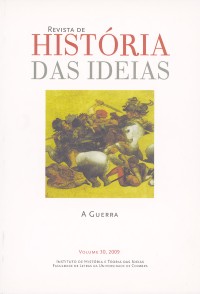Please use this identifier to cite or link to this item:
https://hdl.handle.net/10316.2/41551| DC Field | Value | Language |
|---|---|---|
| dc.contributor.author | Neto, Vítor | - |
| dc.date.accessioned | 2017-05-01T23:37:43Z | |
| dc.date.accessioned | 2020-09-30T11:25:31Z | - |
| dc.date.available | 2017-05-01T23:37:43Z | |
| dc.date.available | 2020-09-30T11:25:31Z | - |
| dc.date.issued | 2009 | - |
| dc.identifier.issn | 0870-0958 | - |
| dc.identifier.issn | 2183-8925 (digital) | - |
| dc.identifier.uri | https://hdl.handle.net/10316.2/41551 | - |
| dc.description.abstract | Na sequência do assassinato por jovens sérvios bosnios do arquiduque Francisco Fernando e de sua esposa, em 28 de Junho de 1914, as tensões políticas e ideológicas aumentaram na zona balcânica e, por extensão, em toda a Europa. Na verdade, desde há muito que se desenhava uma guerra imperialista entre as potencias europeias. Pelo seu significado político e histórico, aquele acontecimento trágico, em Serajevo, funcionou como pretexto para o desencadear de um conflito de grandes proporções. A falencia do pacifismo da II Internacional, acentuada com o assassinato do líder socialista francés, Jean Jaurès, abriu caminho à formação das Uniões Sagradas nos diferentes países. Quase sem se darem conta disso, a Europa e o Mundo envolveram-se numa guerra moderna e absolutamente imprevisível quanto à sua duração e desfecho. | por |
| dc.description.abstract | Following the assassination of Archduke Franz Ferdinand and his wife by young Bosnian Serbs, on 28 June 1914, political and ideological tensions increased in the Balkans and extended to all of Europe. In fact, an imperialist war between the European powers had been taking shape for a long time. Because of its political and historical meaning, the tragic event at Sarajevo served as a pretext to start a conflict of massive proportions. The failure of the pacifism of the Second International, heightened by the assassination of the French Socialist leader Jean Jaurès, opened the way to the establishment of Sacred Unions in several countries. Almost without noticing it, Europe and the world became involved in a modern war whose duration and outcome were completely unpredictable. | eng |
| dc.language.iso | por | - |
| dc.publisher | Imprensa da Universidade de Coimbra | - |
| dc.rights | open access | - |
| dc.title | O atentado de Sarajevo e as origens da Grande Guerra | por |
| dc.title.alternative | The Sarajevo assassination and the origins of the Great War | por |
| dc.type | article | - |
| uc.publication.collection | Revista de História das Ideias vol. 30 | - |
| uc.publication.firstPage | 473 | - |
| uc.publication.lastPage | 489 | - |
| uc.publication.location | Coimbra | - |
| uc.publication.journalTitle | Revista de História das Ideias | - |
| uc.publication.volume | 30 | por |
| dc.identifier.doi | 10.14195/2183-8925_30_26 | - |
| uc.publication.orderno | 27 | - |
| uc.publication.area | Artes e Humanidades | - |
| uc.publication.manifest | https://dl.uc.pt/json/iiif/10316.2/41551/248081/manifest?manifest=/json/iiif/10316.2/41551/248081/manifest | - |
| uc.publication.thumbnail | https://dl.uc.pt/retrieve/11853200 | - |
| item.grantfulltext | open | - |
| item.fulltext | With Fulltext | - |
| Appears in Collections: | Revista de História das Ideias | |
Files in This Item:
| File | Description | Size | Format | |
|---|---|---|---|---|
| o_atentado_de_serajevo.pdf | 8.88 MB | Adobe PDF |  |
Items in DSpace are protected by copyright, with all rights reserved, unless otherwise indicated.
